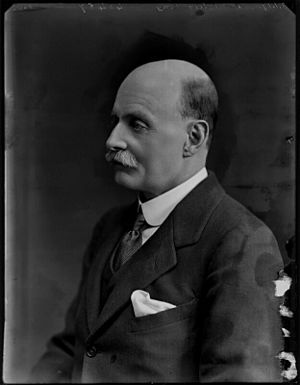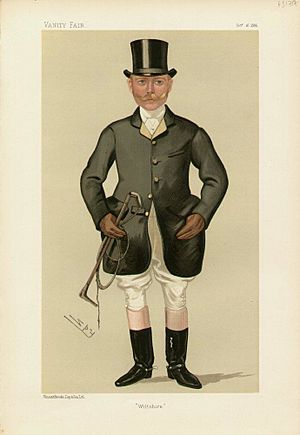Walter Long, 1st Viscount Long facts for kids
Quick facts for kids
The Viscount Long
|
|
|---|---|
 |
|
| Secretary of State for the Colonies | |
| In office 10 December 1916 – 10 January 1919 |
|
| Monarch | George V |
| Prime Minister | David Lloyd George |
| Preceded by | Bonar Law |
| Succeeded by | The Viscount Milner |
| First Lord of the Admiralty | |
| In office 10 January 1919 – 13 February 1921 |
|
| Monarch | George V |
| Prime Minister | David Lloyd George |
| Preceded by | Sir Eric Geddes |
| Succeeded by | The Viscount Lee of Fareham |
| 2nd Leader of the Ulster Unionist Party | |
| In office 1906–1910 |
|
| Preceded by | Edward James Saunderson |
| Succeeded by | Sir Edward Carson |
| 2nd Leader of the Irish Unionist Alliance | |
| In office 1906–1910 |
|
| Preceded by | Edward James Saunderson |
| Succeeded by | Sir Edward Carson |
| Personal details | |
| Born | 13 July 1854 Bath, England |
| Died | 26 September 1924 (aged 70) West Ashton, England |
| Political party | Conservative Ulster Unionist |
| Spouse |
Dorothy Boyle
(m. 1860) |
| Children | 5 |
| Parents | Richard Penruddocke Long Charlotte Anna Dick |
| Alma mater | Christ Church, Oxford |
Walter Hume Long, 1st Viscount Long (born July 13, 1854 – died September 26, 1924) was an important British politician. He was a member of the Conservative Party and also a leader in the Unionist movement. His political career lasted over 40 years. During this time, he held several key government jobs. These included Secretary of State for the Colonies and First Lord of the Admiralty. He is also remembered for his strong connections to Irish Unionism. He led the Irish Unionist Party in the House of Commons from 1906 to 1910.
Contents
Early Life and Education
Walter Long was born in Bath, England. He was the oldest son of Richard Penruddocke Long. His family was well-known in Wiltshire. As a young boy, he lived at Dolforgan Hall in Montgomeryshire. Later, his father inherited the Rood Ashton Estate.
Walter attended Hilperton school and then Harrow. He was popular at Harrow and was a good cricket player. He then went to Christ Church, Oxford for his university studies. After his father passed away in 1875, Walter took over managing the family properties.
He was also an officer in the Royal Wiltshire Yeomanry, a military unit. He became a Major in 1890 and a Lieutenant-Colonel in command from 1898 to 1906.
Starting His Political Career (1880–1911)
Walter Long was very keen on a career in politics. He was elected to Parliament in 1880 for North Wiltshire. He was a Conservative and supported the British Empire and the Church of England. He believed in traditional values.
In 1886, he became a junior minister in Lord Salisbury's government. He worked at the Local Government Board. He helped create the Local Government Act 1888. This law set up elected county councils across England. He also worked on improving housing for working-class people.
Long was very concerned about Home Rule for Ireland. This was a plan to give Ireland more control over its own affairs. He believed it would harm the connection between Ireland and Great Britain. He strongly supported the Irish Unionists who wanted Ireland to remain part of the United Kingdom.
In 1892, he lost his seat in Parliament. However, he was soon elected again in 1893 for Liverpool West Derby. He became an important strategist for his party. He also joined the Royal Commission on Agriculture, which looked into farming issues.
When the Conservatives returned to power in 1895, Long became the President of the Board of Agriculture. He worked to stop the spread of diseases like rabies. He was known for being hardworking and determined.
In 1900, he became the President of the Local Government Board. He worked on local issues and helped combine London's water supply companies into one large board. This was called the Metropolitan Water Board.
Chief Secretary for Ireland
In 1905, Walter Long became the Chief Secretary for Ireland. This was a very important job. He wanted to strengthen the connection between Ireland and Great Britain. He worked closely with Irish Unionists. He believed in keeping law and order in Ireland.
He made a famous speech in Belfast in April 1905. In this speech, he stressed the importance of order and the rule of law. He also worked to help Unionists in Ireland.
Unionist in Opposition
Even when his party was not in power, Long remained a key political figure. He was elected as a Member of Parliament for South Dublin in 1906. He was a leading voice against the Liberal Party's plans for Home Rule in Ireland.
In 1906, he became the new leader of the Irish Unionist Alliance. This group worked to bring together Unionist parties from northern and southern Ireland. In 1907, he also started the Union Defence League. This group supported Irish Unionism in Great Britain.
Long also opposed some of the Liberal Party's new laws. He helped create the Budget Protest League. This group argued against certain tax changes. He was elected as an MP for the Strand in 1910 and later for St George's in 1918.
Later Political Career (1911–1921)
In 1911, when the Conservative party leader resigned, Walter Long was considered a strong candidate to take over. However, to avoid a big fight within the party, he and another candidate stepped aside. This allowed Bonar Law to become the new leader.
During World War I, a special government was formed. Long returned to office in 1915. He helped with the problem of thousands of Belgian refugees. He also played a role in discussions about Home Rule for Ireland during the war. He disagreed with some leaders about how to handle the issue.
In December 1916, Long became the Secretary of State for the Colonies. He held this position until January 1919. Then, he became the First Lord of the Admiralty, which meant he was in charge of the Royal Navy. He served in this role until 1921.
From 1919, he was again very involved in Irish affairs. He led a special committee called the Long Committee on Ireland. This committee was important in creating the Government of Ireland Act 1920. This law led to the Partition of Ireland, dividing Ireland into Northern Ireland and Southern Ireland. Southern Ireland later became the Irish Free State.
In 1921, Walter Long retired from the House of Commons. He was given a special title and became Viscount Long. He was also appointed Lord-Lieutenant of Wiltshire in 1920.
Personal Life
Lord Long married Lady Dorothy Blanche in 1878. They had five children: two sons and three daughters. One of his sons, Brigadier General Walter Long, died in action in 1917.
Walter Long passed away at his home, Rood Ashton House in Wiltshire, in September 1924. He was 70 years old. His grandson, Walter, became the next Viscount Long. Lady Long died in 1938.
 | Audre Lorde |
 | John Berry Meachum |
 | Ferdinand Lee Barnett |


